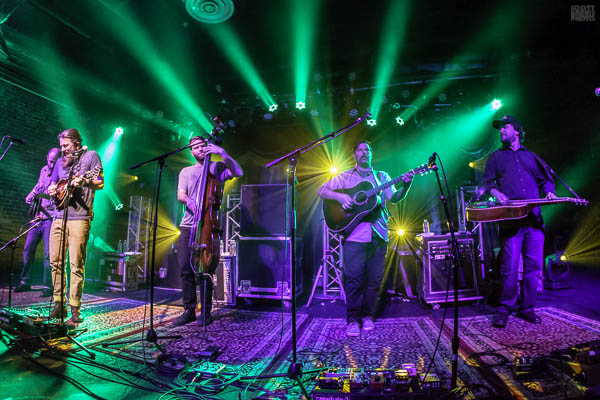
Photo by Scott Harris
The beauty of many modern bluegrass bands is that they can cater to current musical sensibilities while maintaining that old-timey, floor-stomping, country-fried energy that has propelled the uniquely American genre for generations. And if there’s one thing that the boys of Greensky Bluegrass have in spades, it’s energy. And facial hair.
“Sex, drugs, and Flatt and Scruggs,” joked guitarist Dave Bruzza when introducing a song late in the fourth and final set of the band’s two-night stay at the Brooklyn Bowl in Williamsburg. Not to take anything away from Lester and Earl, but Greensky puts on a bluegrass show the likes of which that legendary duo probably never could have imagined.
The Michigan-based quintet kicked off the first evening with a solid opening set, setting the template for all four set lists by putting forth a sampling of their newest album, If Sorrows Swim, mixed with a healthy amount of old Greensky tunes and covers. The second set of the night pushed the musical envelope a bit further, featuring a jammier side of the band (starting with the second song, “Dustbowl Overtures”) before going into a two-song run that exemplified the mix of traditional and modern influences of the band: a scorching run-through of Jimmy Martin’s “Freeborn Man” that bled into a slightly tongue-in-cheek version of Dire Strait’s “Money For Nothing” that included improvised lyrics from mandolinist Paul Hoffman about Brooklyn and its resident hipsters.
But even in such a modern setting, the true bluegrass that is prevalent in these guys cannot be denied. When banjoist Mike Bont picks out that chromatic three-note pickup riff that starts so many bluegrass standards, you know a good time is about to be had. With their incredible individual talent and technical skill, Greensky could shred through a bluegrass burner without breaking a sweat, but it’s better for everyone when they do. When Bruzza briefly forgot the words during one such song, an invigorated rendition of the Stanley Brothers’ “Pig in a Pen,” he and Hoffman took the opportunity for some banter while the quintet continued to vamp—Bruzza blaming Hoffman’s earlier, less obvious slip up for causing his own, and Hoffman offhandedly introducing Bruzza as his big brother—before happily jumping back into the rest of the song. These guys have a huge amount of fun together onstage, and that kind of vibe is contagious.
Hoffman, who is also the main vocalist (and who is by far the champion of both the facial hair contest and the giving-sultry-glares-when-he-sees-a-picture-being-taken-form-the-crowd competition) sets the tempo for the band both literally and figuratively. He is the closest the band has to a frontman, always bouncing with the beat of the music, especially when a bandmate is taking a solo, and seemingly smiling at every individual in the crowd. And with no traditional percussion instrument backing them up, Greensky still manages to create, most notably through Hoffman’s unrelenting strumming and bassist Mike Devol’s thumping lines, a driving beat that could rival any rock band that has the advantage electric guitar and drum set.
In fact, the lines between electric and acoustic are somewhat blurred at a Greensky show. In a lull between songs during the second set of the first night, dobroist Anders Beck looked over to the venue’s bowling lanes and jokingly bet five dollars that the next person up wouldn’t bowl a strike. When he won the bet, he conceded that he didn’t actually need the money because he is “a member of a successful heavy metal band.” And he isn’t so far off, really. All five members play their traditionally acoustic instruments with a virtuosity that would be welcomed in that (or any) genre, and some take their onstage amplification to unexpected levels. Beck, who handles a lot of the soloing in the band, experiments with guitar sounds that range from front porch chill (the charmingly plodding riff in “The Four”) to arena rock shrill (he became a one-man band during his “What Happened to Jim” solos). By implementing distortion, reverb and delay, Beck provides an element of experimental sounds and electrified energy that just isn’t expected from a bluegrass outfit.
After two nights of hootin’, hollerin’, jammin’ and shreddin’, the band decided to end their Brooklyn Bowl run with a special guest that has become synonymous with the venue. Guitarist Eric Krasno, who plays with Soulive and Lettuce and who joined the band for an earlier cover of Norton Buffalo’s “Ain’t No Bread in the Breadbox” (popularized by the Jerry Garcia Band) took the stage again to help the Greensky boys bring the house down with a raging “Midnight Rider” that would have made Duane Allman smile in appreciation. It was an appropriate end for a group of outstanding musicians that, while finding inspiration in innumerable forms of music, prefers to humbly introduce themselves as, simply, “a bluegrass band.”


No Comments comments associated with this post